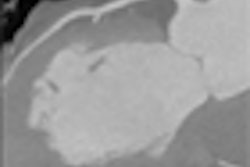
NEW YORK (Reuters Health), Aug 11 - Due to hemoglobin degradation, delayed return of fecal occult blood tests (FOBTs) may cause doctors to miss colorectal adenomas and possibly also overt malignancy, according to a report in the International Journal of Cancer for August 15.
FOBTs have become increasingly more accepted in colorectal cancer screening, note the authors, which makes their stability during transport an important variable.
Based on the findings, "Later stage colorectal cancer patients will probably not be missed due to this delay, but at least a relevant proportion of patients with advanced adenomas and possibly stage I colorectal cancer might be missed even with a delay of a few days," Dr. Leo G. M. van Rossum, from Radboud University Nijmegen Medical Center in the Netherlands, and colleagues state.
The findings stem from a study of 20,623 subjects, 50 to 75 years of age, half of whom were invited to return an immunochemical FOBT sample for testing. FOBTs (OC-Sensor, Eiken Chemical, Tokyo) were returned by 6,157 of the subjects who received them (60%), including 3,767 (61% of the iFOBT group) who reported the date of sampling.
Overall, 3,062 subjects returned the FOBT in less than five days as recommended. Of the remaining 705 patients, 195 took seven days or longer to return the test.
With five or more days of delay, the odds of detecting an adenoma were reduced by 40%, the researchers report.
In a second part of their study, the researchers retested the FOBT samples of 170 subjects with an initially positive result, defined as a hemoglobin level of 50 ng/mL or higher. Five repeat tests were done in each subject, roughly two to three days apart. Colonoscopy was performed in 139 of the subjects (82%) and revealed advanced adenomas in 45 cases (32%) and colorectal cancer in eight (6%).
On average, the authors found that fecal hemoglobin levels fell by 29 ng/mL per day. Among subjects with advanced adenomas, the hemoglobin level was < 50 ng/mL in five patients (11%) two to three days after the initial FOBT and in 16 patients (36%) after 10 to 14 days, the authors note.
Two patients (25%) with colorectal cancer had false-negative results when FOBT was performed seven days after the initial test. In both cases, stage I disease was present and the initial hemoglobin level was 100 ng/mL. This level, the authors note, is uncharacteristically low as the average level for stage I disease is 532 ng/mL.
"Until a less sensitive hemoglobin stabilizing buffer is produced, monitoring delay between fecal sampling and laboratory research should be part of quality control for screening with immunochemical FOBT," the investigators conclude. "Inviting participants to perform a second test when delay is five days or more could be considered."
Int J Cancer 2009;125:746-750.
Last Updated: 2009-08-10 8:38:04 -0400 (Reuters Health)
Related Reading
Fecal occult blood screening may help reduce colorectal cancer mortality, April 6, 2009
Copyright © 2009 Reuters Limited. All rights reserved. Republication or redistribution of Reuters content, including by framing or similar means, is expressly prohibited without the prior written consent of Reuters. Reuters shall not be liable for any errors or delays in the content, or for any actions taken in reliance thereon. Reuters and the Reuters sphere logo are registered trademarks and trademarks of the Reuters group of companies around the world.


















